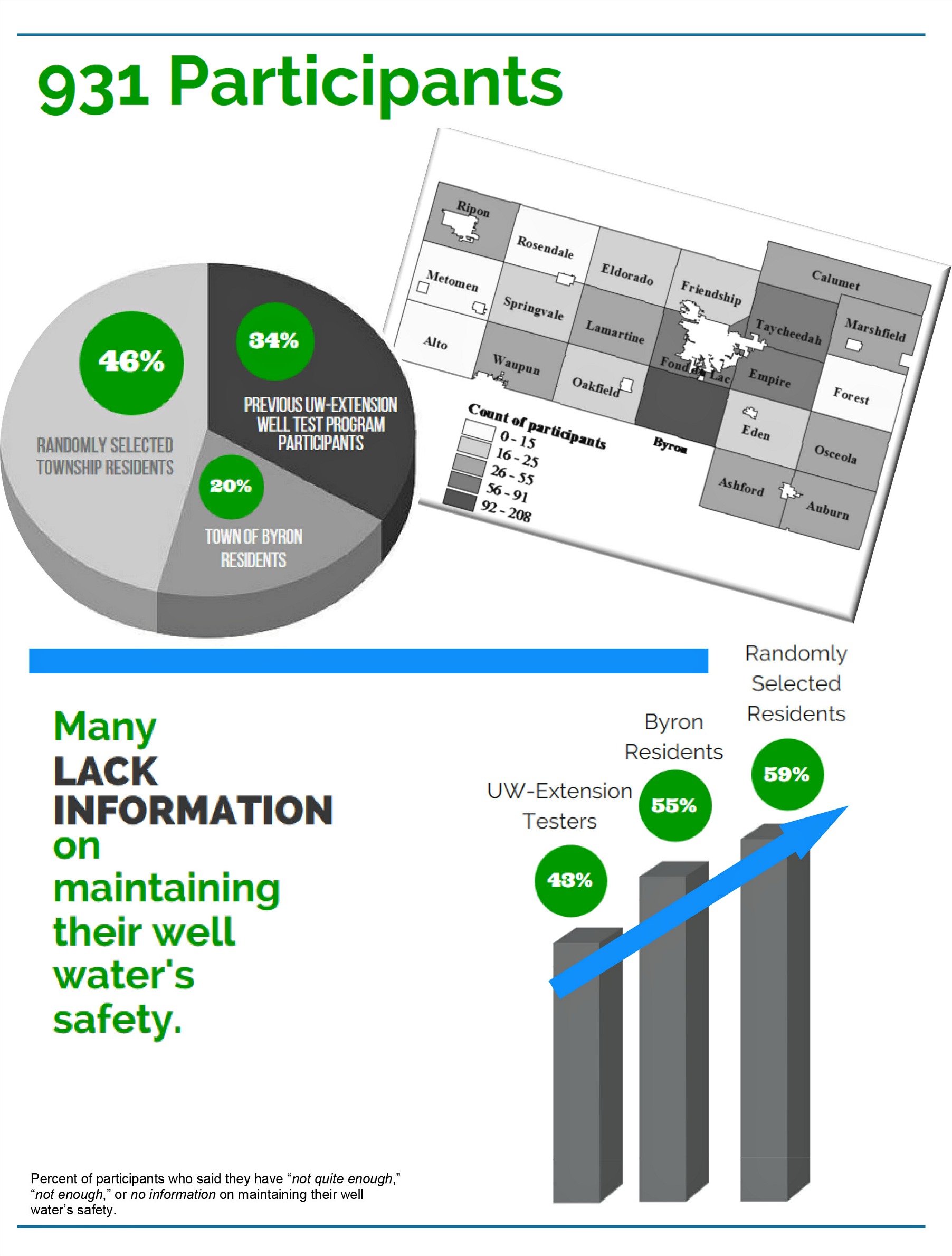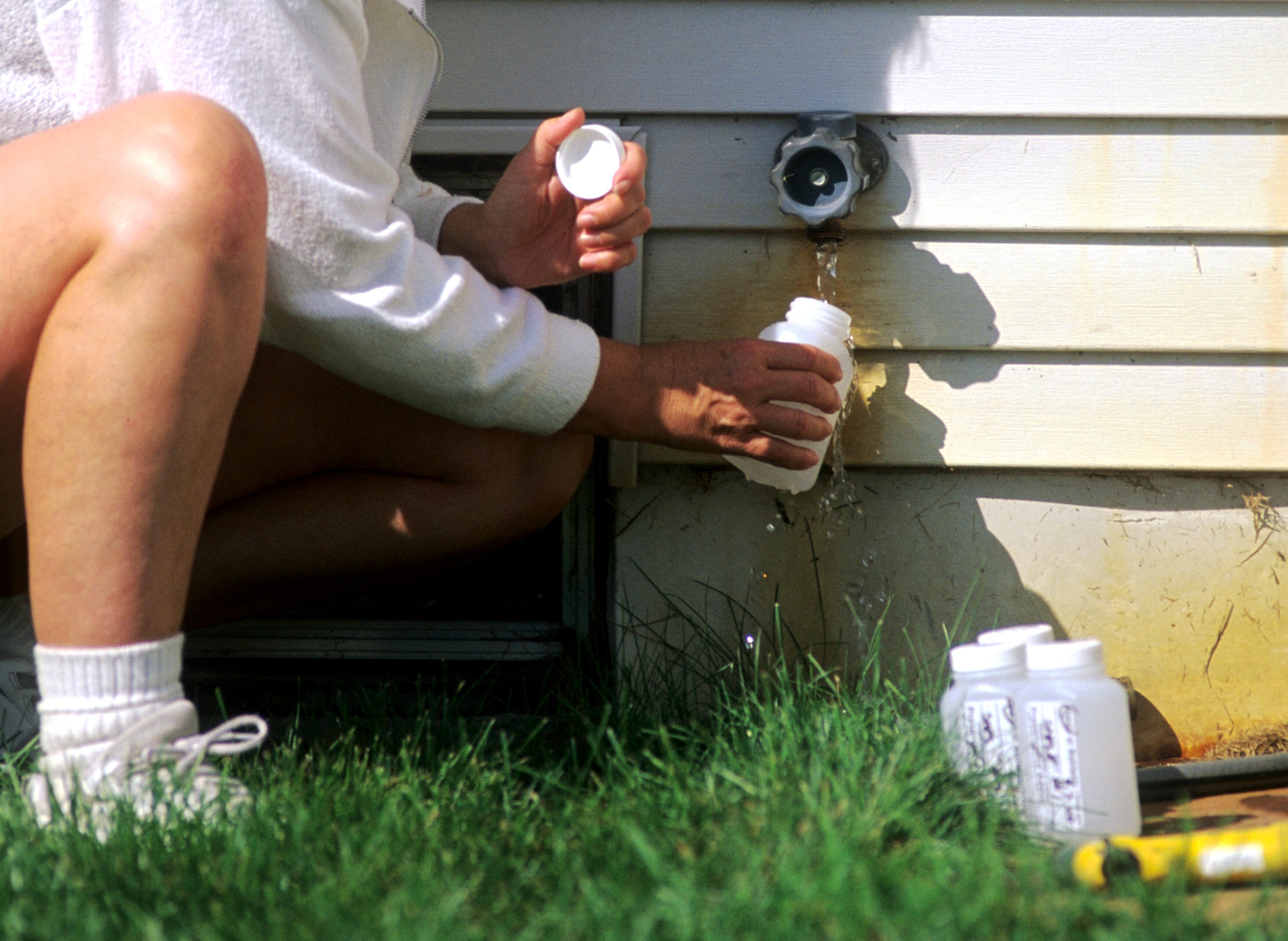What Motivates Rural Wisconsinites To Test Their Drinking Water Source
Given the growing prominence of concerns about drinking water around Wisconsin, understanding what motivates well owners to test for contaminants can help inform educational campaigns about safe practices.
September 28, 2016

Rural Fond du Lac County and Lake Winnebago aerial perspective

Given the growing prominence of concerns about drinking water around Wisconsin, understanding what motivates well owners to test for contaminants can help inform educational campaigns about safe practices. While the majority of private wells in Fond du Lac County produce water of good quality, common contaminants are still detected, including coliform bacteria, nitrate and arsenic. To help its residents, the county conducts an active outreach strategy and routinely offers opportunities to test water quality.
However, to better understand local perspectives about what motivates people to test their drinking water, the University of Wisconsin-Extension Fond du Lac County conducted a survey in 2015 exploring testing practices and behaviors among private well owners. With 931 respondents, the survey focused on people who had their wells assessed through UW-Extension’s water-testing program, residents of the town of Byron (a community where residents and officials are concerned about manure spreading and groundwater quality) and a random sample of rural county residents. Its intention was to assess county well water education efforts and identify areas that could be improved. Complete results are detailed in the final report.
Overall, about two-thirds of survey respondents generally felt their well water was safe. There were differences, though, among different groups of people in their perceptions about water safety.
The survey found 70 percent of men thought their well water was safe or very safe compared to 62 percent of women. Farm residents were more confident that their water was safe or very safe (73 percent), compared to those who lived near an urban area (60 percent safe or very safe), in rural subdivisions (66 percent) or in a rural non-farm setting (67 percent). Respondents who were ages 65 and older and those younger than 35 years were somewhat more confident that their well water was safe or very safe (82 and 79 percent, respectively) than were people in their middle years (61 percent).
However, perception does not necessarily reflect drinking water’s actual safety, and water quality can change over time. Wells should be tested annually for coliform bacteria and nitrate because of their potential threat to human health. These periodic tests are like going to the doctor for a checkup to ensure everything is in working order.
Respondents were generally aware that tests for coliform bacteria, nitrate and arsenic are important to perform. In Wisconsin, when a professional services a well, the state requires it be tested for coliform bacteria, nitrate and arsenic. However, since many years can pass between well servicing, homeowners should consider testing for these contaminants more frequently.
Motivations for testing

Respondents’ motivations for testing well water included knowledge about a testing program taking place, the desire to know whether their water was safe to drink and the opportunity provided by well-repair planning. Byron residents were more likely to test their wells than other groups (29 percent versus 10 percent) because they heard about water quality problems in the area or were more likely to suspect changes to water quality (11 percent versus 5 percent). Across the county, people living in rural subdivisions were more likely to test than were people living on farms.
For women, having young children at home or being pregnant was a higher motivator to test. Nitrate can be a health concern for infants less than 6 months of age or for women who are pregnant because of methemoglobinemia (also known as blue baby syndrome). A byproduct of nitrogen-based fertilizer used in agriculture and common in Fond du Lac County drinking water, nitrate has no taste, smell or color.
The survey sought to find out how often people test their wells. Of the random selection of rural Fond du Lac County residents with private wells, just over one-third indicated that they had tested within the past five years.
As for why people did not test their wells, the most popular response was that non-testers have been drinking their water for years without encountering problems. Two-thirds of respondents said a change in taste, smell or the appearance of their water would prompt them to have their water tested. However, many types of water contamination are not noticeable in these ways. Slightly more than one-third of respondents said they would test if they knew other wells in their town were contaminated or if they knew about a well-testing program happening in their town.
However, the outcome of testing one’s well water cannot be assumed from the results of a neighbor’s test. Well water safety is site-specific; for instance a family’s well may be drilled or cased to a different depth than neighboring wells. Therefore, a well owner cannot rely on a neighbor’s well test results.
Some respondents said they did not test because they did not know how, did not know what to test for, or that testing is available. Finally, about one in five respondents would test if they experienced an unexplained health problem such as frequent diarrheaor stomach aches, or if they received a reminder to test their water.
Outreach makes a difference
The survey results indicate that the Fond du Lac County’s efforts may be showing signs of success. Some 91 percent of survey respondents who participated in previous county efforts were more likely to indicate they planned to tests their wells compared to 65 percent of the randomly selected respondents. Additionally, one in 10 respondents who participated in a county well testing program indicated not having adequate information compared to almost one in four of the well owners in the random sample.
Some valuable information was gleaned that may help to improve outreach efforts. These findings, especially the misapprehension that drinking water must be OK because people do not discern a change in the water or encounter a health problem, highlight where more education can provide important information.

The results suggesting that women were more concerned about their well water quality than men and that people younger than 55 were more likely to be interested in routine testing but more likely to note they lacked information indicate additional directions for education. Reaching out to first-time homeowners and designing materials for younger families are other ideas that came out of this study.
Well owners can take simple steps to improve and understand the quality of their water. Maintenance of the well, such as making sure the cap is secure and no plants or bushes are growing nearby, makes a difference. County health departments around Wisconsin, including Fond du Lac, offer well water testing services. Additionally, the Wisconsin State Laboratory of Hygiene and UW-Extension’s Water and Environmental Analysis Lab will mail sample bottles to residents for testing. If tests indicate problems, UW-Extension and county staff can discuss situations with well owners.
Diana Hammer Tscheschlok is community, natural resource and economic development educator for UW-Extension Fond du Lac County. UW-Extension specialist David Trechter, Shelly Hadley and James Janke of UW-Extension’s Survey Research Center at UW-River Falls conducted the survey and prepared the report. The Well Water User Study 2016 was produced under a 2015-2016 grant from the Wisconsin Environmental Education Board. Additional financial support was provided by the towns of Empire, Byron, Fond du Lac, Oakfield and Ripon, and UW-Extension’s Center for Watershed Science and Education.
 Passport
Passport











Follow Us